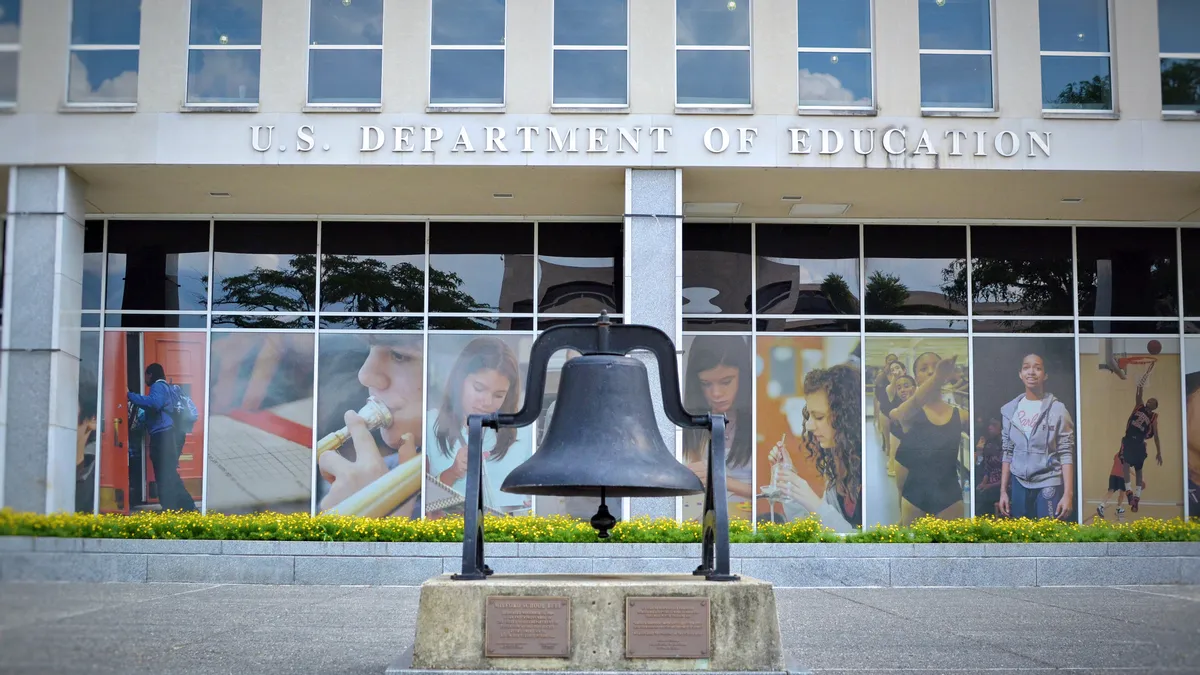Dive Brief:
- In a letter released this week, the Education Department flagged potential "compliance concerns" with the Accrediting Council for Independent Colleges and Schools (ACICS), a troubled accreditor that has previously come under fire for its allegedly shoddy operations.
- A department official wrote to ACICS last month requesting information about its oversight of two private colleges, San Diego University for Integrative Studies and Virginia International University.
- The latest review of ACICS is likely to renew debate around whether the department should sanction the accreditor. The Obama administration revoked its federal recognition in 2016, but the department restored the group's status last year.
Dive Insight:
Democratic lawmakers and higher education pundits have long criticized ACICS for poorly monitoring the institutions under its purview.
ACICS managed two high-profile for-profit college chains, Corinthian Colleges and ITT Technical Institute, which collapsed in 2015 and 2016, respectively. This launched a federal crackdown of the industry, which the current administration is attempting to roll back and has pushed some of these schools to consider alternative operations.
Losing recognition would mean the schools that the accreditor oversees couldn't issue federal student aid. ACICS challenged the Obama administration's decision in court, a process that allowed it to retain its recognition.
Still, many members fled the organization in an attempt to find a new accreditor during that time. (A 2016 Ed Department report said ACICS accredited 245 institutions, but its membership has since dwindled to 74.)
A federal judge ruled last year that the department needed to reconsider the accreditor's recognition, which DeVos ultimately granted in November 2018. ACICS needed to prove to the department it would comply with all federal standards for accreditation within a year.
Leading up to its decision, the department determined ACICS met 19 of 21 of those standards, according to a review by Diane Auer Jones, the department's principal deputy undersecretary, who pushed to reinstate ACICS' recognition. An earlier report by department career staff found ACICS was not in compliance.
ACICS did not respond to Education Dive's request for comment Tuesday.
The Obama administration's actions — along with the exodus of its member institutions and legal fees — apparently left ACICS floundering financially. Inside Higher Ed reported in June that the accreditor expects to lose more than $2 million this year and doesn't expect its budget to break even until 2023.
That and other news reports spurred the department to investigate ACICS' fiscal health, wrote Herman Bounds, director of the department's Accreditation Group, in a letter last month to the accreditor's president, Michelle Edwards. Watchdog group Allied Progress obtained the letter in a public records request and published it online this week.
Though the department projects ACICS would be operating at a deficit for around four more years, Bounds wrote that the accreditor "has sufficient financial resources to carry out its accrediting responsibilities."
But, Bounds wrote, possible failures in vetting Virginia International University and San Diego University for Integrative Studies might put ACICS out of step with federal rules.
Virginia state regulators had attempted to shut down Virginia International after an audit revealed plagiarism among students and low-quality online classes, though ultimately it remained open. Bounds dinged ACICS for allegedly not coming down on the university until after press reported the problems there. The department also questioned if ACICS properly evaluated whether San Diego met accreditation standards.
ACICS's problems never went away, despite the perspective of Auer Jones and other political appointees at the department, said Antoinette Flores, director for postsecondary education at the Center for American Progress, in an interview with Education Dive.
ACICS has historically only taken action after another agency publicly flags issues with their institutions, Flores said. She said she was surprised the department felt ACICS's finances were a non-issue, given that accreditors rely on the colleges they monitor to fund them. Given ACICS's tight financial spot, it would likely be reluctant to punish their institutions, she said.
Further, Flores noted, this summer ACICS was considering just three institutions for accreditation. Now it is reviewing 10, according to its website. This is possibly an attempt to stabilize its budget, she said.
In October, the department officially loosened regulations on accreditors, removing their geographic boundaries and making it easier for colleges to seek approvals for new or changing programs.















